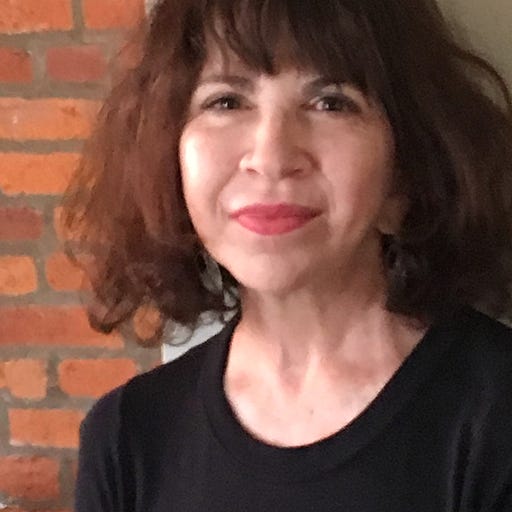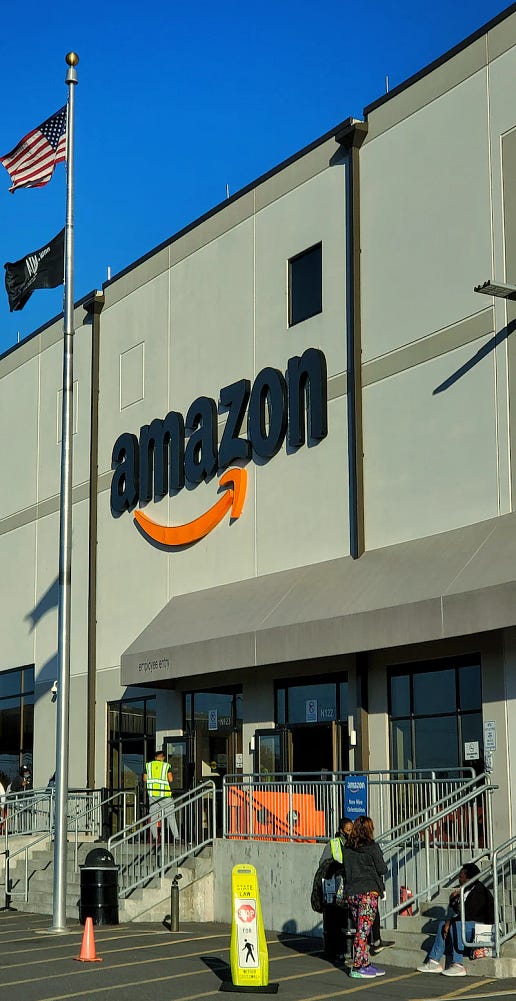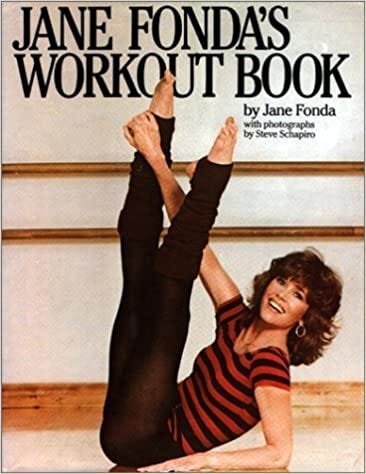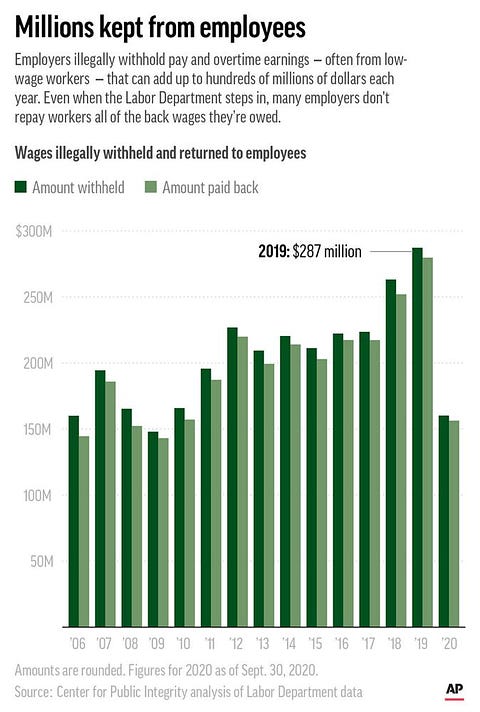Why the Poor Stay Poor in America - How Big Corporations Keep Us Poor...
Welcome to Crime and Punishment: Why the Poor Stay Poor in America. I’m thrilled that you signed up to read my newsletter, and I hope that together, we can make a difference. “They [Researchers for the Oxford Review of Economic Policy] find that monopolistic pricing takes a bite out of every income group’s share of national income, with the notable exception of the top 20 percent, whose incomes rise. In effect, companies are using their market power to extract wealth from poor and middle-class households and deposit it in the pockets of the wealthy, to the tune of about 3 percent of national household income in 2016.” The Washington Post, 2018 Jane Fonda’s Workout book, a 1981 classic that assumed Biblical status with me, didn’t just talk about exercise, but the benefits of sound nutrition, too. I no longer have the book, so I’m paraphrasing from memory, but I’m pretty sure she pointed out that our typical, sugary breakfast was brought to us by a few of the big corporations like General Mills, for example, which had a near monopoly on the breakfast market at the time. And those companies bought their way to our kitchen tables through constant, clever advertising even though what they were selling was chock full of nothing but sugar, and wasn’t good for anyone, let alone growing children. Remember “Tony the Tiger” and his Sugar Frosted Flakes? “They’re Great!”, he roared into our living rooms …and millions of us were hooked. I was hooked too, but rather on Ms. Fonda’s message that remains true today: corporations create monopolies or near monopolies, and through this control have an outsized power to influence our choices and our economy. But humans have free will, a myriad of facts and analyses from which to form their opinions, and the power of laws and policies to affect change. Lack of competition creates fertile ground for monopolies to develop, so larger, wealthier corporations gobble up the smaller companies to eliminate the competitors in their market niche. One example I saw up close is Whole Foods. The company started in Austin, Texas, in 1980 and began it’s expansion across the U.S. and to other countries in 1988. Ironically, it was started by three smaller natural foods stores who banded together to create a larger supermarket for organic and healthier food choices. I had always shopped at tiny “health food stores”, as they used to be called, including co-ops that were organic and vegan long before it became fashionable. But when Whole Foods finally made it to Columbus, Ohio, all of the smaller natural food markets were either purchased by Whole Foods or quickly went out of business. According to a 2017 New York Times article, “Whole Foods early growth came largely from mergers and acquisitions.” In other words, they bought out the competition. The business world thinks this is a just good business practice, but consumers know that the less competition, generally the higher the prices. And so does the federal government. This guidance document from the Federal Trade Commission website discusses the history of antitrust laws in the U.S., starting with the Sherman Act passed in 1890. Today, there are three, main antitrust laws with the overriding goal to promote competition. These laws are designed “…to protect the process of competition for the benefit of consumers…” by keeping prices down and quality up. In July 2021, President Biden issued a detailed Executive Order and accompanying Fact Sheet
And at least a few of the items earmarked for change in the Executive Order have come to fruition, like allowing hearing aids to be sold over the counter and lowering some prescription drug prices. What might be even more important to consumers’ wellbeing than reduced competition is the atmosphere it eventually spawns: the larger and more profitable a corporation grows because it’s one of the few in a product or services niche, the more money it has to persuade lawmakers through intense lobbying efforts, to adopt statutes, regulations and policies that favor its industry. This is no small matter. A 2022 article in Investopedia used data collected from OpenSecrets.org to pull together all political donations and lobbying spending by major industries from January 1, 1998 through September 30, 2021, and the figures are staggering. The pharmaceutical industry takes the lead in spending to influence lawmakers to the tune of $5.17 billion, with a record $356.6 million in 2021 alone. And their legislative focus includes opposing government-run health care, opposing capping and negotiating the price of prescription drugs and “leading the Covid-19 vaccine effort”. According to my research, there is no definitive evidence that links contributed money directly to votes favoring the donors. But at the risk of sounding conspiratorial, this scenario does beg the question whether individual corporations and industry groups would consistently invest this massive amount of money if it didn’t “pay off”. This source from the Princeton University Library gives you the research tools necessary to form your own opinions on the possibility of this connection. Getting back to the Washington Post article quoted above, how do corporations effectively “transfer wealth” from the middle class and poor to their coffers? One way already mentioned is the ability to successfully buy out the competition, and then charge higher prices for their goods and services. You and I pay more, the behemoth corporation earns more profit, and that extra profit, in turn, allows it to possibly buy more influence with elected officials on legislation that benefits the company or industry, and not the typical consumer. Or, it allows them to buy back their own stock to enrich both the corporation and it shareholders. Don’t believe me, read what Robert Reich, former Secretary of Labor, says about the issue of pervasive stock buybacks in a Tweet posted a few days ago:  By the way, the same corporations telling us they have no choice but to raise prices are simultaneously spending billions of dollars on stock buybacks to enrich their wealthy shareholders. Another method used by corporations and many other types of employers, including universities and community colleges, is to misclassify some of their employees, thus excluding them from overtime pay, paid leave and other compensation they would be otherwise entitled to ( I discussed employee misclassification in a previous post). And let’s not forget outright wage theft. This 2021 article from AP NEWS, aptly titled “How Companies Rip Off Poor Employees and Get Away With It”, discusses in great detail how companies and other employers simply flout the law, refusing to pay even minimum wage, and forcing employees to work both before and after their shifts for free. According to EPI economic statistics, this wage theft is costing employees over $15 billion a year. This graph shows a snapshot of wage theft and amounts eventually re-paid through Department of Labor enforcement or independent law suits. According to a Temple University law professor’s testimony at a hearing before the Philadelphia City Council:
___________________________________ What can we individually and collectively do about the outsized influence of big corporations? Boycott certain companies, shop as much as possible at those small, local businesses that remain, report companies you think are violating the law? What else? I’d love to hear your thoughts in the Comment Section below. As always, I appreciate your interest and thoughtful ideas that make our Crime and Punishment community a welcoming space to visit and chat. There’s no time like the present to become a free or paid subscriber…and there’s no time like the New Year to Upgrade your free subscription to paid — it’s easy, and will allow me to continue and expand Crime and Punishment. Thanks in advance for your support! You’re on the free list for Crime and Punishment: Why the Poor Stay Poor In America. All posts are free for now, but if you’d like to get ahead of the crowd, feel free to support my work by becoming a paid subscriber. |
Older messages
Weekday Reads: Why Scientists Battle To Understand The Natural World
Tuesday, January 31, 2023
And What They're Learning
White Collar Crime
Wednesday, January 25, 2023
Listen now (10 min) | It Costs Us Way More In dollars Than Street Crime But Few Know Its Reach
Critical Thinking
Friday, January 20, 2023
Listen now (11 min) | And The Part It Plays In Making Positive Change
The Spirit of Dr. Martin Luther King, Jr.
Friday, January 20, 2023
It Lives In Each Person Who Works For Positive Change
Creating Increased "Fairness" In Our Economy
Sunday, January 8, 2023
Listen now (8 min) | Is There A Path Forward?
You Might Also Like
5-Bullet Friday — How to Choose Peace of Mind Over Productivity, Guinean Beats for Winding Down, Lessons from Legendary Coach Raveling, and a New Chapter from THE NO BOOK
Saturday, March 1, 2025
"Easy, relaxed, breathing always leads to surprise: at how centred we already are, how unhurried we are underneath it all." — David Whyte ͏ ͏ ͏ ͏ ͏ ͏ ͏ ͏ ͏ ͏ ͏ ͏ ͏ ͏ ͏ ͏ ͏ ͏ ͏ ͏ ͏ ͏ ͏ ͏ ͏ ͏ ͏
Nicole Kidman's “Butter Biscuit” Hair Transformation Is A Perfect Color Refresh
Saturday, March 1, 2025
Just in time for spring. The Zoe Report Daily The Zoe Report 2.28.2025 Nicole Kidman's “Butter Biscuit” Hair Transformation Is A Perfect Color Refresh (Celebrity) Nicole Kidman's “Butter
David Beckham's Lifestyle Keeps Him Shredded at 50
Friday, February 28, 2025
View in Browser Men's Health SHOP MVP EXCLUSIVES SUBSCRIBE David Beckham's Lifestyle Keeps Him Shredded at 50 David Beckham's Lifestyle Keeps Him Shredded at 50 The soccer legend opens up
7 Home Upgrades That Require Zero Tools
Friday, February 28, 2025
Skype Is Dead. There are plenty of ways to make quick improvements to your house without a single hammer or screwdriver. Not displaying correctly? View this newsletter online. TODAY'S FEATURED
Heidi Klum Matched Her Red Thong To Her Shoes Like A Total Pro
Friday, February 28, 2025
Plus, the benefits of "brain flossing," your daily horoscope, and more. Feb. 28, 2025 Bustle Daily Here's every zodiac sign's horoscope for March 2025. ASTROLOGY Here's Your March
How Trans Teens Are Dealing With Trump 2.0, in Their Words
Friday, February 28, 2025
Today in style, self, culture, and power. The Cut February 28, 2025 POWER How Trans Teens Are Dealing With Trump 2.0, in Their Words “Being called your correct name and pronouns can be the difference
The Eater Oscars for best bites in film this year
Friday, February 28, 2025
An NYC cafe garners celebrity support after rent hike
The Must-See Movies The Oscars Overlooked
Friday, February 28, 2025
Plus: Celebrities pay tribute to Michelle Trachtenberg. • Feb. 28, 2025 Up Next Your complete guide to industry-shaping entertainment news, exclusive interviews with A-list celebs, and what you should
The Best Cropped Jackets for Spring, Styled by Us
Friday, February 28, 2025
Plus: What we carried in our bags at Fashion Week. The Cut Shop February 28, 2025 Every product is independently selected by our editors. Things you buy through our links may earn us a commission.
The chicken and the eggs
Friday, February 28, 2025
and where they both come from ͏ ͏ ͏ ͏ ͏ ͏ ͏ ͏ ͏ ͏ ͏ ͏ ͏ ͏ ͏ ͏ ͏ ͏ ͏ ͏ ͏ ͏ ͏ ͏ ͏ ͏ ͏ ͏ ͏ ͏ ͏ ͏ ͏ ͏ ͏ ͏ ͏ ͏ ͏ ͏ ͏ ͏ ͏ ͏ ͏ ͏ ͏ ͏ ͏ ͏ ͏ ͏ ͏ ͏ ͏ ͏ ͏ ͏ ͏ ͏ ͏ ͏ ͏ ͏ ͏ ͏ ͏ ͏ ͏ ͏ ͏ ͏ ͏ ͏ ͏ ͏ ͏ ͏ ͏ ͏ ͏ ͏ ͏ ͏ ͏ ͏



